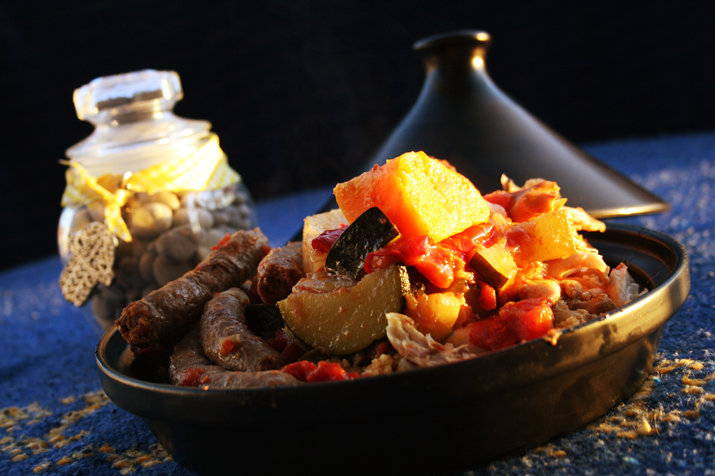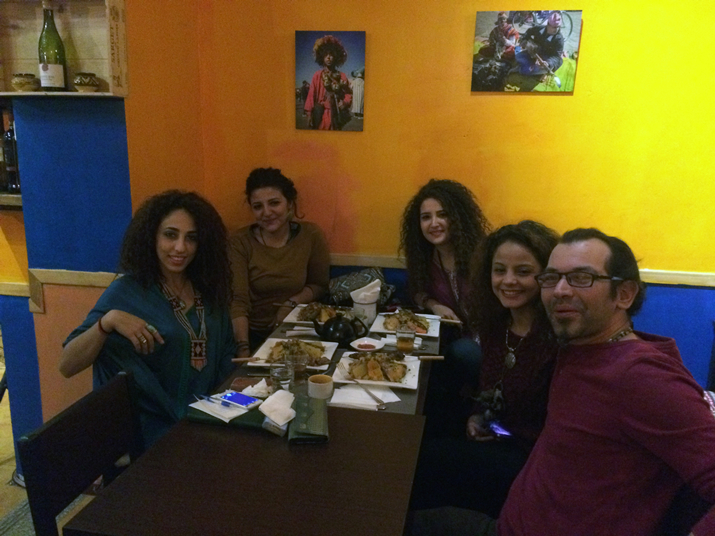|
|||||||||||
|
|
| Food for Thought |
| Like rice, pasta or noodles, North Africa’s couscous has become a global delicacy |
| By Sudeshna Sarkar and Xia Yuanyuan | VOL. 8 June 2016 |

Couscous is a versatile dish that can be eaten with meat or vegetables or as a dessert
In his boyhood home in Casablanca, Morocco, where Badr Benjelloun grew up, he remembers how Fridays were a special day.
"Morocco is a Muslim country and so, the Friday prayers are the biggest prayers. That is how the community comes together," the 37-year-old Moroccan, who has made Beijing his second home for a decade now, said nostalgically, stopping to punctuate his reminiscences with greetings as patrons sauntered into his restaurant for the Friday special.
"After the prayers, there would be the special couscous lunch when the whole family would eat together. It was not just an act of eating but an act of sharing and relieving the stress of the week," he said. "The couscous would take four to five hours to make and there would be an atmosphere of festive gaiety. Women from neighboring houses would put up tables side by side where they would chop, pound, chat and laugh together. It was an act of love."
When Benjelloun went to the United States in the 1990s to study chemical engineering, he became tired of the endless burgers and pasta and longed for the flavors of Casablanca. An all-night phone conversation with his mother about how to make couscous was the start of his culinary journey. He made the dish on his own the next day and it tasted terrible but he kept on at it. By his second year in the United States, he had become proficient enough to be asked to cook couscous for 100 people at a college event.
That was how his couscous connection grew stronger even though away from home and 15 months ago, when Benjelloun opened his own restaurant in Beijing, couscous became the star attraction on Fridays.
"We serve couscous only during Friday lunch because that was how it was done back home," he explained. "I have brought that tradition to Beijing."
History on the plate
Couscous has a long and extensive tradition. Like pasta, rice or noodles, it is a regional food that has gone global. Originating among the nomadic Berber tribe of North Africa, it spread to Central and Southern Africa, Europe, the Americas and Asia. A 13th-century cookbook with Spanish and African dishes, Kitb al-abkh f al-Maghrib wa’l-ndalus, has a couscous recipe, alcuzcuz fityn, saying it is known worldwide.
History abounds with references to couscous dishes. When the arguably most famous Moroccan traveler, Ibn Battuta, went to Mali in 1352, he recorded a local custom of hospitality: "When the traveler arrives in a village, [women] take out millet, sour milk, chickens, lotus-flour, rice, founi [Digitaria exilis], which resembles mustard grains, and they make a couscous."
Couscous has also been associated with magic and miracles, somewhat like manna in the Bible. Ahmed Ibn Mohammed al-Maqqar, a 17th-century historian, narrates the story of a good Samaritan nursing an ill man. Prophet Mohammed appears in his dream and tells him to feed his patient a couscous dish for a miraculous cure. Another Islamic scholar, Ibn Falallah, describes Tunisian pilgrims in Mecca conjuring up a couscous dish with beef and cabbage cooked in butter.
Couscous has a fiesta entirely devoted to it. The Couscous Fest, the world’s only couscous festival, is held every year in San Vito Lo Capo Town in Sicily, Italy.
Home thoughts from abroad
Language, music and food are the three prime factors bringing migrants together in a foreign country. Adams Bodomo, Professor of African studies at the University of Vienna, has researched extensively on the African diaspora in China, including their food habits. He attests to the presence of couscous in Yiwu, the city in east China boasting the world’s largest small commodity wholesale market as well as a sizeable North African population.
"There are definitely couscous dishes in Yiwu within the Maheda and other restaurant districts," Bodomo told ChinAfrica . "This dish is popular among Maghrebian Africans from countries like Egypt, Algeria, Libya, Morocco, and Tunisia."
In We Are What We Eat, his paper on the food habits of Africans in Yiwu and Guangzhou, a city in south China, Bodomo writes: "One of the first things an African does on landing at the airport or train station and checking into their hotel is to look for the nearest African restaurant or any space in which Africans can gather to cook food and eat... In the process they make business connections [and] also cultural connections, social relations... and various other relationships."
Mayosse Boupo hasn’t exactly stepped off the first flight to Beijing from Libreville, Gabon, having been living in the Chinese capital since 2005. Still, the Gabonese student at the Beijing University of Technology likes to look for African food when he is with other Africans, and a couscous dish, topped with chickpeas, meat and pumpkin slices, is a consensual choice for their group.
The 30-year-old regards couscous as a unifying food. "Couscous is widely spread, notably where there are Muslims," Boupo said. "I am a Christian but still we eat couscous in our family and when with friends."
 |
|
Badr Benjelloun has brought the Friday couscous lunch tradition to Beijing from Casablanca |
For Hosaim El-maghrabi, who has been working as a journalist in Beijing since 2005, couscous is linked with happiness. "My mother would make couscous whenever she was happy," said the 38-year-old from Assiut, a city in Upper Egypt. "It was a breakfast dish for us, a dessert made with milk and honey. In the Arabic world, food is something that brings people together. Having the dessert together would mean you hope your relationship grows as sweet. That’s the main point."
His friend Aly Thabet Aly Mohamed Farag, a younger compatriot from Cairo also working as a journalist in Beijing, agreed. "We used to have couscous after Fajr, the first dawn prayers, on Friday," the 30-year-old said dreamily. "We had a large family - five brothers - and I remember all of us laughing, exchanging jokes while eating the couscous my father brought home from the little carts waiting in front of mosques. There have been changes in Egypt since my childhood, those carts have disappeared and I left home almost eight years ago. But couscous takes me back and I hope someday, I can eat it with my family again."
Cousacousa in China
It’s not only North Africans and people from the Middle East who are eating couscous in China. The Chinese too have started embracing what is locally known as cousacousa.
Mo Fei, a Chinese-Australian lawyer practicing in Beijing and a big fan of healthy eating, loves couscous salads with leafy vegetables and sun-dried tomatoes since they are light and healthy.
"You don’t feel stuffed," the 32-year-old said. "Couscous is not just limited to Morocco. It is very popular in Australia and Europe. As the Chinese travel outside more and become more international, and more foreigners come to live in China, China will learn to appreciate couscous more."
Indeed, Taobao, China’s largest online shopping platform, already has many e-stores selling couscous. Search for couscous and hundreds of shops pop up, selling different brands imported from different places worldwide.
The 51XSH is a Taobao store specializing in Western food. Its customer service staff says instant couscous is their star product. They sell over 150 packets every month. "Our couscous products are very easy to cook," she said. "Just stir the powder with oil, salt and water and it is done in five minutes."
Though purists would be aghast, instant couscous has its fans. A customer identifying herself only as Xiaoniu, said the instant couscous at 51XSH tastes like the authentic version she had in Morocco when she traveled there. "I miss the taste of couscous when I am back in China and Taobao is a big help," she said.
The power of couscous
Bodomo thinks when it comes to the issue of soft power in Africa-China relations, food is an African trump card to influence the host. "It would be one of the most important ‘tools’ available for African community members to attempt to impose their cultural influence on their host community," he says in the paper.
"More and more Chinese are beginning to patronize the African restaurants in Guangzhou and Yiwu. Africans are enthusiastically introducing African food to their trading partners and customers... These African restaurant owners are serving as cultural ambassadors and cross-cultural bridge builders between Africans and Chinese."
And couscous is a powerful weapon in that arsenal.
|
|||
| Copyright ChinAfrica All right reserved 京ICP备08005356号 |